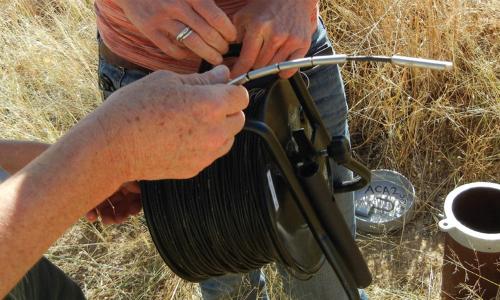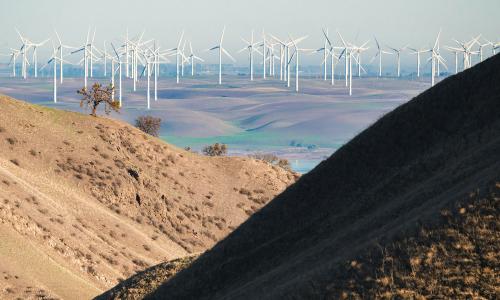Table of Contents
Groundwater sustainability plans should be science-based, address climate change, and protect California's water resources for future generations.
Groundwater is a critical resource for California. It provides a crucial buffer against drought and the growing impacts of global warming, especially the diminishing mountain snowpack that has historically been a linchpin of California's water supply.
Over the last century, however, groundwater in California has been largely unregulated. This has led to severe declines in groundwater levels in many places, particularly California's Central Valley.
Sustainable groundwater management is essential to adapt to this massive loss of water storage and continued decline in snowpack—California is projected to lose up to 80 percent of its historic snowpack by the end of the century as temperatures continue to rise.
Right now, however, we are pumping out groundwater much faster than it is being replaced in many places.
The Sustainable Groundwater Management Act
The good news is that California’s severe and ongoing drought helped spur the passage of the 2014 Sustainable Groundwater Management Act, the first-ever statewide effort to comprehensively measure and manage groundwater.
One of the act's key provisions is that local groundwater sustainability agencies (GSAs) must develop Groundwater Sustainability Plans (GSPs) by 2020. If a groundwater sustainability plan is not adequate or leads to undesirable results, the State Water Board can step in to manage the basin.
In the coming years, local groundwater management entities will need to determine how to reach sustainability by 2040 and avoid undesirable results along the way. Scientists, community members, and other stakeholders will need to work together to make sure that local groundwater sustainability plans are science-based, address climate change, and protect our water resources for the future.
This web page is intended to be a resource for local stakeholders, GSAs, and state agencies who are interested in the implementation of the Sustainable Groundwater Management Act.
Measurable objectives: a crucial tool for evaluating progress
Groundwater planning is not new to California—there have been voluntary efforts in the past that described qualitative basin management objectives. However, the new law requires, for the first time, that groundwater basins be managed using “measurable objectives.”
Measurable objectives provide quantitative thresholds and interim milestones that can be used to gauge progress toward sustainability. To better understand how GSAs might develop measurable objectives and to inform the development of the GSP regulations by the Department of Water Resources, UCS released a report in fall 2015, Measuring What Matters: Setting Measurable Objectives to Achieve Sustainable Groundwater Management in California. The report includes an in-depth review of the current state of practice, in California and beyond.
This research suggests that measurable objectives play a crucial role in evaluating performance, reducing uncertainty, and improving resource management through time. If objectives are not clear, measurable, and agreed-upon at the outset, it will be difficult for resource managers to assess progress and make management decisions.
Unprecedented stakeholder engagement
The Sustainable Groundwater Management Act (SGMA) is groundbreaking, not only in its mandate for sustainable groundwater supplies, but also for the process that it outlines to get there—SGMA requires collaboration across agencies and between stakeholders that will be unprecedented in many groundwater basins.
While active stakeholder engagement requires greater upfront resource commitments, decades of research and real-world experience suggest that investing in engagement can lead to numerous benefits that improve implementation and management over the long term.
To help provide a roadmap for successful stakeholder engagment, the Community Water Center, Clean Water Fund, and Union of Concerned Scientists collaborated on a 2015 report that provides essential reading, including numerous case studies and other useful resources.
Learn more:
Additional resources and information
Juliet Christian-Smith, climate scientist and UCS expert on California groundwater issues, provides regular insights and analysis on our blog, The Equation.
The Big Water Supply Shift: This fact sheet highlights how drought and climate change are depleting California's traditional water supplies from snowmelt-fed reservoirs, rivers, and streams--and how California must plan for a different water future.
Learn more:
WEBINAR. The Tipping Point: How 2016 Will Shape California's Water Future: For over a century in California, decisions about water—one of the most fundamental public resources—have been made by a water elite, often behind closed doors. There's just too much on the line for this to continue. We need scientists, experts, and citizens to be engaged in order to form policy that works for the long term.
The Union of Concerned Scientists is working to shine a light on the big water policy decisions coming up in 2016, and help scientists and the public get involved in these critical processes. This webinar highlights two decisions being made this year that will have long-lasting impacts: how local agencies should comply with the Sustainable Groundwater Management Act and the how projects will be evaluated for public funding from Prop 1.
UCS has also produced three webinars related to the Sustainable Groundwater Management Act:
Sustainable Groundwater Management Act: New Requirements and Tools: The 2014 passage of the Sustainable Groundwater Management Act brought changes in the form of new requirements for management plans. This discussion highlights those changes, while giving insight into publicly available tools that can be used to measure, monitor, and better understand our groundwater systems.
A Roadmap to Stakeholder Engagement: The Sustainable Groundwater Management Act establishes collaboration and stakeholder engagement as key to achieving the objectives of the law, yet local agencies charged with implementing the law are likely still left with many questions as to what that means. While some of the statutory requirements for stakeholder engagement are quite specific, many are not. This webinar highlighs recommendations from the perspective of the state, community-based organizations, and non-profit organizations.
Setting Measurable Objectives to Achieve Sustainable Groundwater: The Sustainable Groundwater Management Act requires groundwater local plans to contain measurable objectives to achieve the “sustainability goal.” Yet, the legislation does not specifically define measurable objectives, or how they should be set or measured over time. To better understand how groundwater sustainability agencies might develop measurable objectives, this webinar reviews the key features of effective measurable objectives for groundwater management in California and beyond.
For additional information on California groundwater, please visit the California Department of Water Resources Groundwater site.




